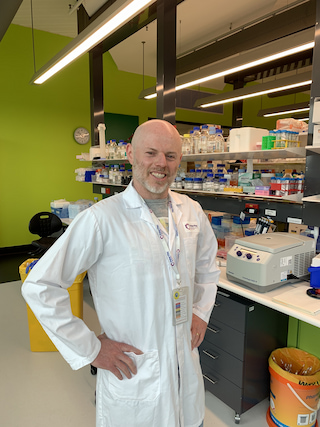Targeting DCAF as a novel treatment strategy for therapy-resistant myeloma
Developing a myeloma treatment with maximum efficacy and minimal side effects is the aim of the multidisciplinary research team that received the 2021/22 Leukemia Lymphoma Society-Snowdome Foundation-Leukaemia Foundation (LLS-SF-LF) Translational Research Program grant.

This project is led by Dr Lev Kats (University of Melbourne), Prof. Jake Shortt (Monash University), Prof. Philip Thompson (Monash University), and A/Prof. Chris Ott (Massachusetts General Hospital, U.S.).
Myeloma, which affects around 1,800 Australians each year, is still classed as an incurable blood cancer, and while treatment advances have been made in recent years, a group of myeloma patients do not respond to treatment, and their prognosis remains poor.
Some of the most active myeloma treatments that have shown great success in the clinic, work by interfering with how protein is managed by the cell. This research team believes it has found a treatment target that might prove beneficial in myeloma patients, including those with disease that is resistant to current treatments. The team proposes that, by targeting the cell pathway known as DCAF, which is involved with how cells utilise protein, they could successfully reduce myeloma cell survival.
DCAFs are used by many cell types to manage protein functions. Myeloma cells are particularly sensitive to this DCAF pathway being interfered with and cell death is achieved when the pathway is either blocked or hijacked.
The LLS-SF-LF grant is funding the multidisciplinary team to identify the best molecule to target the DCAF pathway. Dr Kats will provide cell biology knowledge, Prof. Thompson and A/Prof. Ott will provide chemistry and drug development knowledge, and Prof. Jake Shortt will provide the clinical and therapeutic insight.
“This year our group has been building on our knowledge of the biology of DCAF1,” said Dr Kats.
“Using genome editing technology we have generated myeloma cells in which we can artificially degrade the DCAF1 protein using a plant hormone called auxin.
“This is important because it enables us to investigate what happens to cells when DCAF1 function is perturbed. We know DCAF1 regulates the abundance of other proteins in myeloma cells, but we do not yet know what those proteins are,” he explained.
“We also do not fully understand the cell death pathways that are triggered when DCAF1 is lost or inhibited. Characterising early events after auxin treatment in our engineered cells will also enable us to later test whether the inhibitors and PROTACS (a type of drug that can be used to direct degradation of target proteins) we are developing are ‘on target’, by comparing their effects on myeloma cells directly to genetic degradation of their intended molecular target.
“At the same time, we have been generating new chemical matter to develop DCAF1 PROTACS. To do this we are introducing various modifications to our established inhibitor, VPR8. We are initially testing whether these modifications affect the binding of the molecules to DCAF1 and/or cell permeability,” said Dr Kats.
“Over the next 12 months we will complete detailed characterisation of our engineered myeloma cells using proteomics methods (a technique that can measure the abundance of different proteins in cells).
“We also plan to ramp up our medicinal chemistry efforts. New molecules will be generated using VPR8 or BC1901S (another DCAF1 binder that binds to a different part of DCAF1) as the scaffold and characterised,” said Dr Kats.
Having already uncovered a drug that works well to interfere with the DCAF pathway in myeloma cells and having the ability to kill myeloma cells through this novel mode of action in test tubes and pre-clinical models, the next step is to refine and optimise the drug so it can be taken by humans.
Funding from the LLS-SF-LF grant is allowing the team to refine their research and move this research from the lab bench to treating patients.
Last updated on October 19th, 2022
Developed by the Leukaemia Foundation in consultation with people living with a blood cancer, Leukaemia Foundation support staff, haematology nursing staff and/or Australian clinical haematologists. This content is provided for information purposes only and we urge you to always seek advice from a registered health care professional for diagnosis, treatment and answers to your medical questions, including the suitability of a particular therapy, service, product or treatment in your circumstances. The Leukaemia Foundation shall not bear any liability for any person relying on the materials contained on this website.